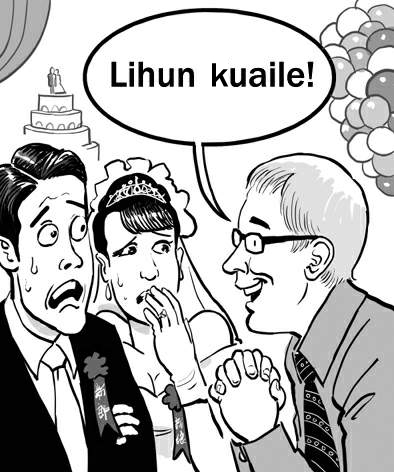Life and Leisure
Congratulations on your divorce, my forest is in the lobby
By Erik Nilsson (China Daily)
Updated: 2010-10-27 08:13
 |
Large Medium Small |
"Congratulations," I told the newlyweds, "on your divorce!"
The bride appeared bemused and the groom grimaced. Then, they started chuckling, as they realized how I'd conjured such a dumb twist of the tongue.
I had chanced upon a wedding while traveling in Yunnan province and it had been suggested I offer a few felicitous words.
So I did - but not quite in the way my hosts, or I, had intended. It was an honest mistake, as "hunli" means "wedding" and "lihun" means "divorce".

Indeed, the more Chinese I learn, the more words I have at my disposal not only for communication but also for miscommunication.
Most of my Mandarin mix-ups have been more nonsensical than offensive, though one does need to be careful with the Mandarin word for "Internet caf". I was informed of this upon failing to get the tones right and, consequently, saying a very bad word relating to the courtship practices of certain shelled reptiles.
Over the years, I have asked hotels if I could leave my forest (senlin), rather than my luggage (xingli), in the lobby. I have talked about putting clothes in my Xiyouji (the title of the classic novel Journey to the West) rather than in my laundry machine (xiyiji). And rather than say I was born in the Year of the Pig, I used to say, "I am a pig".
But, sometimes, I've found, I can even be speaking my native tongue and have it misinterpreted in Chinese.
I was recently eating at a Sichuan restaurant in Hubei province when a young lad at the table next to ours, who appeared to be about 5, apparently bit into a peppercorn, and started howling and sobbing.
I felt quite bad for the little fire-eater, so I muttered in English, "Poor guy"!
But, perhaps because I'd only been speaking Mandarin up to that point in the meal, my fellow diners instead heard, "Huo gai!" or, "Serves him right"!
My father has been studying Chinese with a tutor in the US and has also been finding his ability to say what he wants is growing with his propensity to say what he doesn't.
The first time I saw this in action was when we were speaking Chinese in Sweden, where he said the women were "pianyi" (cheap). He meant they were piaoliang (pretty).
When relating to his old tutor the story of how I once crashed an electric bike into a rice paddy during a family vacation in Guangxi Zhuang autonomous region, he said I tumbled into "mifan" (steamed rice).
She laughed so hard that, Dad says, he has never since forgotten "daotian" (the correct word for "rice paddy").
However, that doesn't mean he doesn't still accidentally switch simple words, such as "your" and "my".
That's why Dad recently asked his new tutor, Jared, how Dad's wife liked his tutor's remodeled bedroom.
Dad's experiences also demonstrate the confusion created by the linguistic crossover works both ways. When discussing driving directions, Jared kept talking about making a turn at the "xing" (pronounced "shing").
Both were baffled until my father figured out he was talking about a crossing. The word is written as "Xing" on US traffic signs, and Jared had unwittingly applied the pinyin pronunciation.
But perhaps my father's funniest Mandarin mangling came when he tried to tell a Beijing vendor he already owned what she was trying to sell him. Because he happened to be patting his belly at the moment he said "you le", rather than say, "already got one", he said, "I'm pregnant".
I'm currently starting a new vocabulary list from which I should learn 30 written words a lesson. And I'm looking forward to not only being able to use them but also to not being able to help but sometimes misuse them.
China Daily
